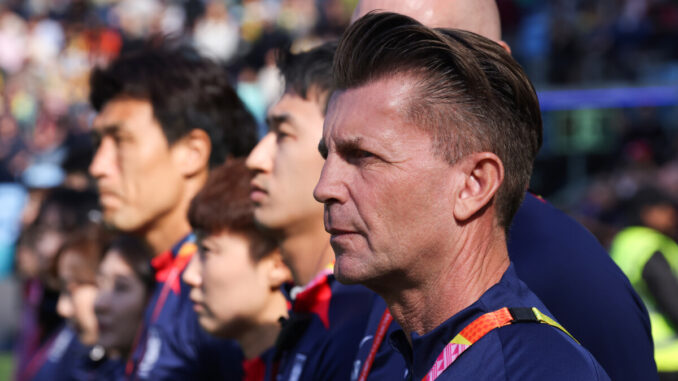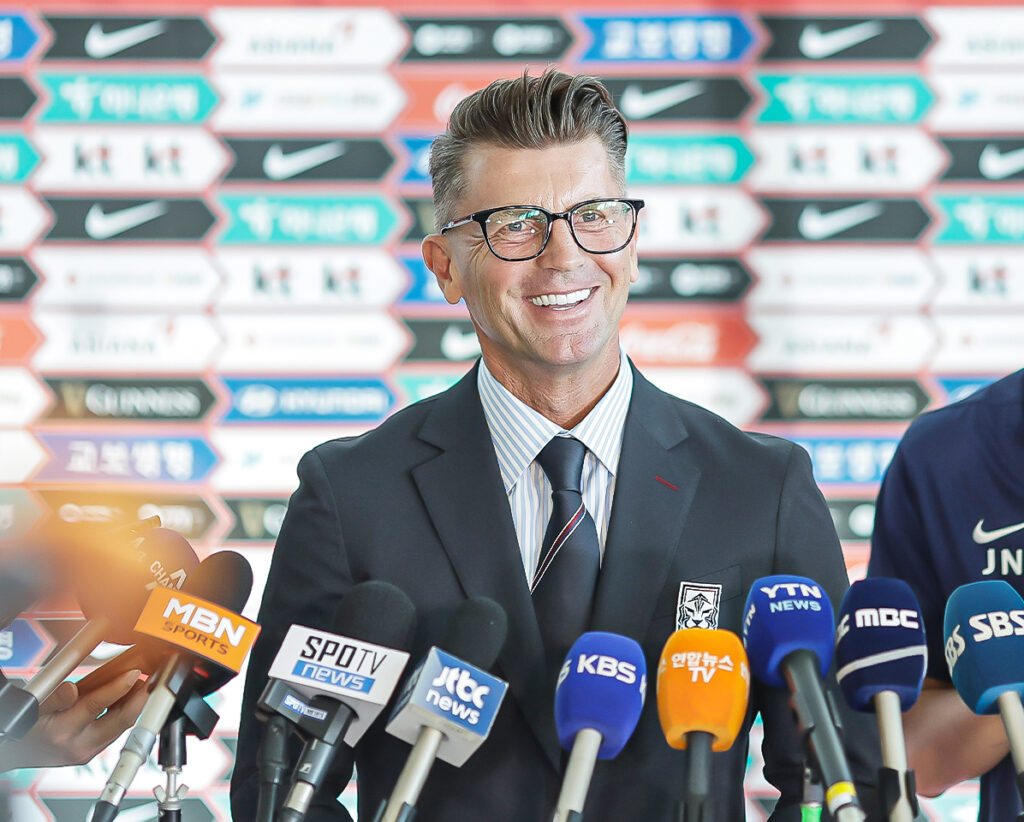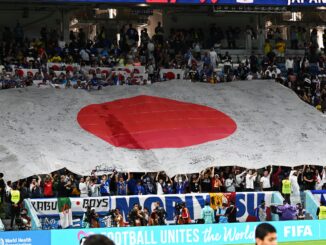

Colin Bell doesn’t have a Whole Lotta Love for South Korea’s football system.
The country’s head coach showed the set up No Quarter after his side’s 1-0 loss against Morocco on Sunday saw the Koreans move to the brink of elimination at the Women’s World Cup, the result leaving the Englishman and his team Dazed and Confused.
Bell referenced Seventies rock behemoths Led Zeppelin – and in a more convincing fashion than the poor attempt in the opening paragraphs of this story – as he sought to highlight the issues that are stopping South Korea from matching the rapid development happening elsewhere.
“There are systematic changes that we need to address and they need to be addressed now quite clearly,” Bell said following the defeat at Hindmarsh Stadium that left his team with only a mathematical chance of advancing to the last 16 ahead of their final game against Germany.
“South Korea have had four World Cups now and only once have they been able to get out of the group (in Canada in 2015). And now we can’t forget there’s more teams coming into the World Cup.
“I think we have talented young players in our underage teams that we need to be bringing on much faster. We need to give them the platform to be able to perform at senior level earlier. As far as I’m concerned we need to restructure the whole football.
“I’ve spent the majority of my career in Germany and this is a typical trait of Germany. They’ve had a lot of success and then they’ve hit a spell where there was no success. You could look back to say 2001, 2002. They got to the (men’s World Cup) final, but it still wasn’t a great team. Then they restructured everything.
“The Germans are very good at like: ‘Okay, now we are not successful, we have to change something, and we have to be drastic in what we change’. And then, all of a sudden, in 2006 you’ve got the third place and in 2014 the men win the World Cup.
“But the whole DFB, the whole football association changed, so that means you go into a successful period. In Germany men’s football is also at a crossroads now but they will figure it out.
“Coming back to us as women’s football in South Korea, we need to, as far as I’m concerned, rethink everything about the system. You can change coach, you can change players, but if the system remains the same, you will get the same result.
“This is a slap in the face for me as a coach, for us all. But we’ve got to wake up to the reality that what we’re doing is obviously not successful or not successful enough. Or it’s not going to bring us enough success to be able to compete with the top nations.
“You have other nations – and Morocco are one of them – investing, they’re supporting and they will gradually improve and improve and improve.
“We see that with Vietnam, we see that with the Philippines if you’re talking about now Asian nations. Uzbekistan was focused on and have already proven that they’re changing things in women’s football.
“We have to change things. We have to change the system. You can change personnel, you can change players, coaches, but if the system remains the same, you get the same result.
“So it almost sounds like a song or an album from Led Zeppelin: The Song Remains The Same. You get the same result and we have to change the song.”
Embed from Getty ImagesBell had spoken after the opening loss to Colombia about his frustration at how the country’s semi-professional WK League does not do enough to prepare players for the rigours of the game at the highest level.
It was a subject he broached again after the Morocco defeat as he doubled down on that criticism while lamenting the difficulties that exist in bringing younger players into the national set-up.
“If you look at the whole squad, we’ve tried and picked the top names, and that’s why I don’t really now want to go into individual performances or look at the big picture at the moment, I think we’ll do that internally,” he said.
“But the girls have proven that they’ve been able to play at that level. We’ve done it time and time again. I don’t want to reveal too much but I think personally, maybe the biggest factor is to be able to perform in a stress situation at the highest level.
“That’s more of a psychological aspect than a physical. I repeat myself: the players are not used to playing at this kind of intensity, not just physical but also mental. And also when you lose, it hurts. When you lose you face consequences.
“Whereas in the WK League, where the majority of our players play, if you win, it’s nice. And if you lose, it’s not so bad, but there’s no consequences. There’s no consequence for defeat. There’s no relegation.
“The playoff system for me personally is a system that is nonsensical and doesn’t belong in football. You want to win finish first or if you finish last or second last you get relegated. That is competition.

“And this is the competition, this is reality. The World Cup is the reality. We have the best players, the best teams, the best coaches on view. If you lose, it hurts if you lose, you get knocked out. That’s the reality and that’s happened to us. And that’s a slap in the face.
“We’ve got to wake up, we have to wake up to the reality. The reality of life is sometimes difficult. Life is sometimes tough and you have to live in reality. You can’t live in a dream world like some people would rather do.
“Black is black. White is white, as far as I’m concerned.”
One of Bell’s biggest concerns is the age profile of his squad, one of the highest at the Women’s World Cup.
While much has been made about the selection of Casey Phair, who became the youngest player ever to feature at the tournament at 16 years and 26 days, 12 of Bell’s 23 players in Australia are 30 or older and only four – Phair, Choo Hyo-joo, Chun Ga-ram and Bae Ye-bin – are under 25 years of age.
“We have a lot of players in the squad that have performed in the past at a good level and have many appearances for South Korea and we put their career on the line or hang them out dry,” he said. “That’s not the way I want to do it.
“My players have earned the respect that I give them and that’s what they’ll receive in the next few days and that’s what they’ll receive for the match against Germany. But we have a squad we need to be looking at in detail.
“We’ve tried to bring in those younger players to give them that experience and these young players that have experienced this World Cup will also experience now that disappointment and also be exposed to consequences for poor results, and that means being knocked out. That means going home after the game against Germany.
Embed from Getty Images“That will be tough, but it will be an experience that hopefully they will be able to use for their future because we do have younger players coming through. And that’s again the Korean system.
“They need to be playing senior football when they’re good enough, at 16, 17, 18 but in Korea that doesn’t happen. They come in at 23, 24 years old, and then people wonder why we have eight players that are over 30. They’ve only played six years senior football or seven years senior football some of them, so that’s what I mean when I’m talking about the system.”
Bell recently signed a contract extension which means, unless there is a significant Communication Breakdown (sorry…more Led Zeppelin!) between the Englishman and the Korea Football Association, the 61-year-old will be in place to either benefit from the changes he is calling for or be frustrated by the failure to evolve.
“We don’t have many girls playing football, but we have some that are really talented,” he said. “So as far as I’m concerned, you need a clear philosophy that’s coming from the association that goes into the schools, cooperation with the schools.
“We need underage teams, we need K-League teams supporting the women’s game, bringing in their own women’s structure, having underage girls playing against each other, the best playing against the best. That should be, as far as I’m concerned, also at club level, under 12, under 13, and under 14, 15, 16 girls playing against each other.
“That’s not possible in Korea; it’s schools, then it goes to university and then they go into the WK league, and we’ve already spoken about that. The whole thing needs to be restructured and to go into a clear philosophy and a clear vision for women’s football.
“I often hear the comparison to Japan coming from our side, but Japan have had a clear philosophy for many years. And they have, I think, a vision for the next 30 years.
“Our underage girls need more football. Our underage teams need to be coming in on a regular basis. We need to restructure the system, we need to restructure the national teams.
“And if that is possible, then I think we should try all together to try and accomplish that.”
Listen to The Asian Game Podcast LIVE from the FIFA Women’s World Cup




